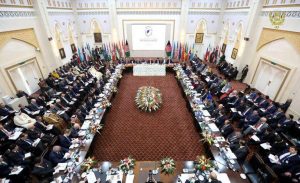KProcess-2” and Hours of Political Ceremonial Literature
The second round of “Kabul process” conference held on Wednesday under tight security situation. The government of Afghanistan described the conference as a golden opportunity for the stability of the country. Representatives of more than 25 countries gathered to find a way to solve the crisis in Afghanistan.

The second round of “Kabul process” conference held on Wednesday under tight security situation. The government of Afghanistan described the conference as a golden opportunity for the stability of the country. Representatives of more than 25 countries gathered to find a way to solve the crisis in Afghanistan.
The representatives of different countries and the government of Afghanistan all emphasized on ending the Afghan war. The countries sponsoring Afghanistan promised cooperation, saying no country should refuge terrorism and seek a policy in Afghanistan’s territory that ensures justice.
Representatives of Britain and Germany invited the Taliban to peace and the Afghan government also said it is ready to recognize Taliban as a political party and negotiate with them without any precondition.
But what is really important, is the ceremonial literature in such conferences. From the remarks of the first person of the government to Afghan officials and representatives of regional countries were full of ritual literature – a rabble-rousing literature.
Mohammad Ashraf Ghani spoke about many issues in his rhetoric, including emphasized that all factions of Afghanistan community turned to a national consensus in consultation with the government and high peace council. The government of Afghanistan said that from scholars to civil society and tribal elders all agreed on one issue, and that is providing peace and national unity in Afghanistan.
These optimistic statements of the president raised while political, ethnic and linguistic tensions have reminded the bitter memory of the 1370s since the beginning of NUG led by Ghani and Abdullah.
The Afghan people and non-politic society of Afghanistan do not always have hope in holding such conferences and its reason is clear, and that is the same rabble-rousing and ritualistic literature.
Yet, some politicians and critics of the current administration say: in conferences being held in Kabul, the representatives of regional countries and the government of Afghanistan agree on some issues before holding the meeting, and the next day, make some optimistic speeches and pour soil on people’s eyes.
Akhtar Suhail